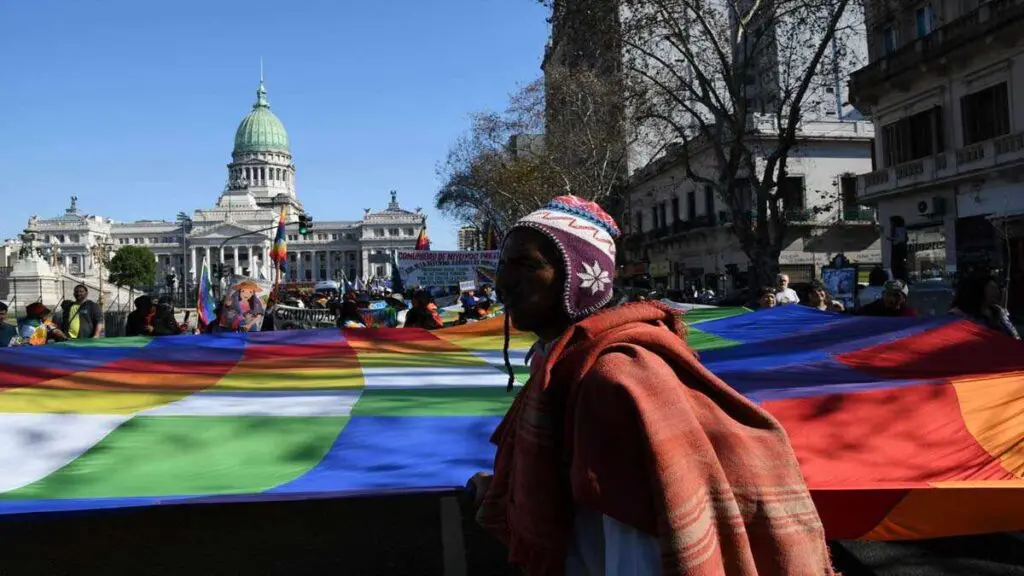
The Government of Javier Milei has tried to eliminate the National Institute of Indigenous Affairs (Inadi). Photo: Télam
United Nations, November 11 (RHC)-- Argentina, the country where there are 58 indigenous or native peoples according to its 2022 Population Census, was the only nation that voted this Monday against a United Nations resolution on the rights of indigenous peoples.
Out of a total of 168 votes in favor, the Government of Argentina turned its back on the resolution that seeks to strengthen the rights of indigenous communities in areas such as justice, the environment and the preservation of ancestral languages and traditions.
Furthermore, in a context where 29.3 percent of the population that identifies itself as indigenous or descended from indigenous peoples, said it spoke or understood the language of its people, the country that represents them denied the agreement that grants the right for indigenous peoples to participate in decisions that affect their territories.
The UN declaration specifies that it recognizes “the urgent need to respect and promote the intrinsic rights of indigenous peoples, which derive from their political, economic and social structures and from their cultures, their spiritual traditions, their history and their philosophy, especially the rights to their lands, territories and resources.”
Likewise, the resolution denied by the Government of Javier Milei establishes that indigenous people have the right, as peoples or as individuals, to the full enjoyment of all human rights and fundamental freedoms recognized in the Charter of the United Nations, the Universal Declaration of Human Rights and international human rights standards.
Likewise, it recognizes that indigenous peoples and individuals are free and equal to all other peoples and persons and have the right not to be subject to any type of discrimination in the exercise of their rights, as well as the right to self-determination.
The Ibero-American General Secretariat (Segib) reported this year that 38.4 percent of the 556 indigenous languages in Latin America and the Caribbean are at risk of disappearing. According to the study, there are three factors that make languages vulnerable: racism and discrimination against people, societies and indigenous knowledge; the failure of the State to comply with current legislation (which should protect, promote and make indigenous languages visible); and the interruption of the intergenerational transmission of languages.
Complaints against indigenous peoples and their territory
For its part, the Tierra Viva news agency has denounced that the coming to power of La Libertad Avanza reinforces the systematic national and provincial policies of denial of the rights of indigenous peoples.
“In Argentina, the current government administration is unprecedented in terms of ideology and is following a path that is difficult to describe. And even more difficult to foresee in the immediate future. Its declared policy of dismantling the State (not just shrinking it) has complex consequences to assess in its full dimension, in an ever-changing and dynamic scenario,” they acknowledge.
The National Institute against Discrimination, Xenophobia and Racism (Inadi) was eliminated by the Government of Javier Milei, as well as its attempt to eliminate the National Institute of Indigenous Affairs (INAI).
However, the Government appointed Mauricio Macri's former Secretary of Human Rights to head the organization. One of the actions against indigenous peoples is what happened in Mendoza this November: Governor Alfredo Cornejo, an ally of President Javier Milei, got the INAI to review the recognition of ancestral lands of three Mapuche communities, crossed by the interests of the “Malargüe mining district” project.
By the time the State began to repair the damages of a ferocious genocide, community work in Malargüe had an echo in a series of policies that allowed for a re-discussion of the basic rights to possess the land, or at least not to be evicted.
“This is how coordinated work between public and scientific organizations began, with the intention of interpreting this long silenced history. One of the results of this collective introspection was the work of the INAI in reconstructing a genealogy of pastoral work in Malargüe. Although not all the ranching families assumed this perspective, many of them made territorial claims that the organization attended to since 2009, promoting anthropological and geographical research work for more than a decade,” said the Tierra Viva news agency.
By highlighting the identity of the native peoples and the struggle for the recovery of their territory, the platform recognizes that “the province of Mendoza is rich in landscapes and history. Its boundaries bring together mineral and agricultural wealth and diverse subjectivities. The Malargüe department has an even more particular physiognomy: there is mining fortune, clear skies and you can still see the clearest traces of the original communities that moved from Wallmapu to the current Argentine pampas.”

